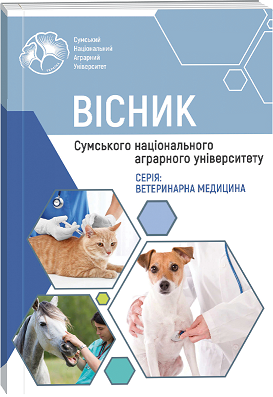ВИЗНАЧЕННЯ ВПЛИВУ ПРОБІОТИКУ НА МЕТАБОЛІЗМ ПОРОСЯТ
Анотація
Регулювання складу кишкової мікрофлори є однією з поширених практик, яка застосовуються для попередження дизбактеріозу, підвищення продуктивності та росту поросят. Пробіотики покращують здоров’я кишечника, сприяють засвоюванню поживних речовин та мають антиоксидантний ефект. Експериментальні дослідження проводили в умовах віварію Сумського національного аграрного університету. Вісім свиноматок утримували з підсисними поросятами, які отримували стартовий комбікорм та експериментальні пробіотичні добавки. Визначали біохімічні показники крові корів у корів та свиноматок на початку та по закінченню дослідження. Встановлено, що пробіотики сприяли збільшенню вмісту загального білка та альбуміну у поросят першої дослідної групи був вірогідно вище на 14,39-16,74 %, другої – на 12,38-19,55 %, третьої – на 13,40-30,66 % (р≤0,05), четвертої – на 5,08-30,26 %, п’ятої – на 5,37-23,41 %, порівняно з контролем. Вміст глобулінів був вище у поросят першої дослідної та другої групи на 12,56-7,07 %, відповідно. Вміст сечовини та загального холестерину у крові поросят дослідних та контрольної груп був у межах фізіологічної норми. Рівень глюкози у першій дослідній групі рівень глюкози був вище на 21,84 %, другій – на 3,64 %, четвертій – на 26,05 %, п’ятій – на 18,21 %. Активність ферменту АЛТ була менше у першій дослідній групі на 23,27 %, другої – на 34,48 %, третьої – на 40,51 %, четвертої – на 19,82 %, п’ятої – на 29,31 % (р≤0,05). Вміст АСТ був більше у крові поросят першої дослідної групи на 5,92 % та у третьої – на 11,11 %, менше у другій – на 9,62 %, у четвертій – на 27,40 %. Активність ЛФ була нижче у першій групі на 10,69 %, в другій – на 16,32 %(р≤0,05), в третій – на 3,30 %, в четвертій – на 12,14 %, в п’ятій – на 5,65 %. Кількість ЦІК була більше у першій групі на 81,81 %, в другій – на 45,45 %, в тертій – на 63,63 %, в четвертій – на 27,27 %, в п’ятій – на 9,09 %. У поросят дослідних груп зменшився рівень серомукоїдів у першій на 42,41 %, у другій – на 36,84 %, у третій – на 26,31%, у четвертій – на 31,57 %, у п’ятій – на 26,31%.
Посилання
2. Canibe, N., Højberg, O., Kongsted, H., Vodolazska, D., Lauridsen, C., Nielsen, T. S., & Schönherz, A. A. (2022). Review on Preventive Measures to Reduce Post-Weaning Diarrhoea in Piglets. Animals : an open access journal from MDPI, 12(19), 2585. https://doi.org/10.3390/ani12192585
3. Cao, G., , Tao, F., , Hu, Y., , Li, Z., , Zhang, Y., , Deng, B., , & Zhan, X., (2019). Positive effects of a Clostridium butyricum-based compound probiotic on growth performance, immune responses, intestinal morphology, hypothalamic neurotransmitters, and colonic microbiota in weaned piglets. Food & function, 10(5), 2926–2934. https://doi.org/10.1039/c8fo02370k
4. Cao, G., Yang, S., Wang, H., Zhang, R., Wu, Y., Liu, J., Qiu, K., Dong, Y., & Yue, M. (2023). Effects of Bacillus licheniformis on the Growth Performance, Antioxidant Capacity, Ileal Morphology, Intestinal Short Chain Fatty Acids, and Colonic Microflora in Piglets Challenged with Lipopolysaccharide. Animals : an open access journal from MDPI, 13(13), 2172. https://doi.org/10.3390/ani13132172
5. Casas, G. A., Blavi, L., Cross, T. L., Lee, A. H., Swanson, K. S., & Stein, H. H. (2020). Inclusion of the direct-fed microbial Clostridium butyricum in diets for weanling pigs increases growth performance and tends to increase villus height and crypt depth, but does not change intestinal microbial abundance. Journal of animal science, 98(1), skz372. https://doi.org/10.1093/jas/skz372
6. Chang, C. H., Teng, P. Y., Lee, T. T., & Yu, B. (2019). The effects of the supplementation of multi-strain probiotics on intestinal microbiota, metabolites and inflammation of young SPF chickens challenged with Salmonella enterica subsp. enterica. Animal science journal = Nihon chikusan Gakkaiho, 90(6), 737–746. https://doi.org/10.1111/asj.13205
7. Chen, Y. C., & Yu, Y. H. (2020). Bacillus licheniformis-fermented products improve growth performance and the fecal microbiota community in broilers. Poultry science, 99(3), 1432–1443. https://doi.org/10.1016/j.psj.2019.10.061
8. Cheng, C. S., Wei, H. K., Wang, P., Yu, H. C., Zhang, X. M., Jiang, S. W., & Peng, J. (2019). Early intervention with faecal microbiota transplantation: an effective means to improve growth performance and the intestinal development of suckling piglets. Animal : an international journal of animal bioscience, 13(3), 533–541. https://doi.org/10.1017/S1751731118001611
9. Dittoe, D. K., Olson, E. G., & Ricke, S. C. (2022). Impact of the gastrointestinal microbiome and fermentation metabolites on broiler performance. Poultry science, 101(5), 101786. https://doi.org/10.1016/j.psj.2022.101786
10. European convention for the protection of vertebrate animals used for experimental and other scientific purposes. (1986). Retrieved from https://rm.coe.int/168007a67b
11. Gresse, R., Chaucheyras-Durand, F., Fleury, M. A., Van de Wiele, T., Forano, E., & Blanquet-Diot, S. (2017). Gut Microbiota Dysbiosis in Postweaning Piglets: Understanding the Keys to Health. Trends in microbiology, 25(10), 851–873. https://doi.org/10.1016/j.tim.2017.05.004
12. Hartung, T. (2010). Comparative analysis of the revised Directive 2010/63/EU for the protection of laboratory animals with its predecessor 86/609/EEC – a t4 report. ALTEX – Alternatives to Animal Experimentation, 27(4), 285-303. doi: 10.14573/altex.2010.4.285.
13. Hu, S., Cao, X., Wu, Y., Mei, X., Xu, H., Wang, Y., Zhang, X., Gong, L., & Li, W. (2018). Effects of Probiotic Bacillus as an Alternative of Antibiotics on Digestive Enzymes Activity and Intestinal Integrity of Piglets. Frontiers in microbiology, 9, 2427. https://doi.org/10.3389/fmicb.2018.02427
14. Karasova, D., Crhanova, M., Babak, V., Jerabek, M., Brzobohaty, L., Matesova, Z., & Rychlik, I. (2021). Development of piglet gut microbiota at the time of weaning influences development of postweaning diarrhea – A field study. Research in veterinary science, 135, 59–65. https://doi.org/10.1016/j.rvsc.2020.12.022
15. Kim, Y. G., Sakamoto, K., Seo, S. U., Pickard, J. M., Gillilland, M. G., 3rd, Pudlo, N. A., Hoostal, M., Li, X., Wang, T. D., Feehley, T., Stefka, A. T., Schmidt, T. M., Martens, E. C., Fukuda, S., Inohara, N., Nagler, C. R., & Núñez, G. (2017). Neonatal acquisition of Clostridia species protects against colonization by bacterial pathogens. Science (New York, N.Y.), 356(6335), 315–319. https://doi.org/10.1126/science.aag2029
16. Kwoji, I. D., Aiyegoro, O. A., Okpeku, M., & Adeleke, M. A. (2021). Multi-Strain Probiotics: Synergy among Isolates Enhances Biological Activities. Biology, 10(4), 322. https://doi.org/10.3390/biology10040322
17. Law of Ukraine No. 249 “On The procedure for carrying out experiments and experiments on animals by scientific institutions”. (2012, March). Retrieved from https://zakon.rada.gov.ua/laws/show/z0416-12#Text .
18. Litvak, Y., & Bäumler, A. J. (2019). The founder hypothesis: A basis for microbiota resistance, diversity in taxa carriage, and colonization resistance against pathogens. PLoS pathogens, 15(2), e1007563. https://doi.org/10.1371/journal.ppat.1007563
19. Ma, C., Azad, M. A. K., Tang, W., Zhu, Q., Wang, W., Gao, Q., & Kong, X. (2022). Maternal probiotics supplementation improves immune and antioxidant function in suckling piglets via modifying gut microbiota. Journal of applied microbiology, 133(2), 515–528. https://doi.org/10.1111/jam.15572
20. Pan, X., Cai, Y., Kong, L., Xiao, C., Zhu, Q., & Song, Z. (2022). Probiotic Effects of Bacillus licheniformis DSM5749 on Growth Performance and Intestinal Microecological Balance of Laying Hens. Frontiers in nutrition, 9, 868093. https://doi.org/10.3389/fnut.2022.868093
21. Poulsen, A. R., Jonge, N., Nielsen, J. L., Højberg, O., Lauridsen, C., Cutting, S. M., & Canibe, N. (2018). Impact of Bacillus spp. spores and gentamicin on the gastrointestinal microbiota of suckling and newly weaned piglets. PloS one, 13(11), e0207382. https://doi.org/10.1371/journal.pone.0207382
22. Saladrigas-García, M., Solà-Oriol, D., López-Vergé, S., D'Angelo, M., Collado, M. C., Nielsen, B., Faldyna, M., Pérez, J. F., & Martín-Orúe, S. M. (2022). Potential effect of two Bacillus probiotic strains on performance and fecal microbiota of breeding sows and their piglets. Journal of animal science, 100(6), skac163. https://doi.org/10.1093/jas/skac163
23. Su, W., Gong, T., Jiang, Z., Lu, Z., & Wang, Y. (2022). The Role of Probiotics in Alleviating Postweaning Diarrhea in Piglets From the Perspective of Intestinal Barriers. Frontiers in cellular and infection microbiology, 12, 883107. https://doi.org/10.3389/fcimb.2022.883107
24. Vadopalas, L., Ruzauskas, M., Lele, V., Starkute, V., Zavistanaviciute, P., Zokaityte, E., Bartkevics, V., Badaras, S., Klupsaite, D., Mozuriene, E., Dauksiene, A., Sidlauskiene, S., Gruzauskas, R., & Bartkiene, E. (2020). Pigs' Feed Fermentation Model with Antimicrobial Lactic Acid Bacteria Strains Combination by Changing Extruded Soya to Biomodified Local Feed Stock. Animals : an open access journal from MDPI, 10(5), 783. https://doi.org/10.3390/ani10050783
25. Wang, K., , Cao, G., , Zhang, H., , Li, Q., , & Yang, C., (2019). Effects of Clostridium butyricum and Enterococcus faecalis on growth performance, immune function, intestinal morphology, volatile fatty acids, and intestinal flora in a piglet model. Food & function, 10(12), 7844–7854. https://doi.org/10.1039/c9fo01650c
26. Wang, K., Chen, G., Cao, G., Xu, Y., Wang, Y., & Yang, C. (2019). Effects of Clostridium butyricum and Enterococcus faecalis on growth performance, intestinal structure, and inflammation in lipopolysaccharide-challenged weaned piglets. Journal of animal science, 97(10), 4140–4151. https://doi.org/10.1093/jas/skz235
27. Yue, S., Li, Z., Hu, F., & Picimbon, J. F. (2020). Curing piglets from diarrhea and preparation of a healthy microbiome with Bacillus treatment for industrial animal breeding. Scientific reports, 10(1), 19476. https://doi.org/10.1038/s41598-020-75207-1

 ISSN
ISSN  ISSN
ISSN 



